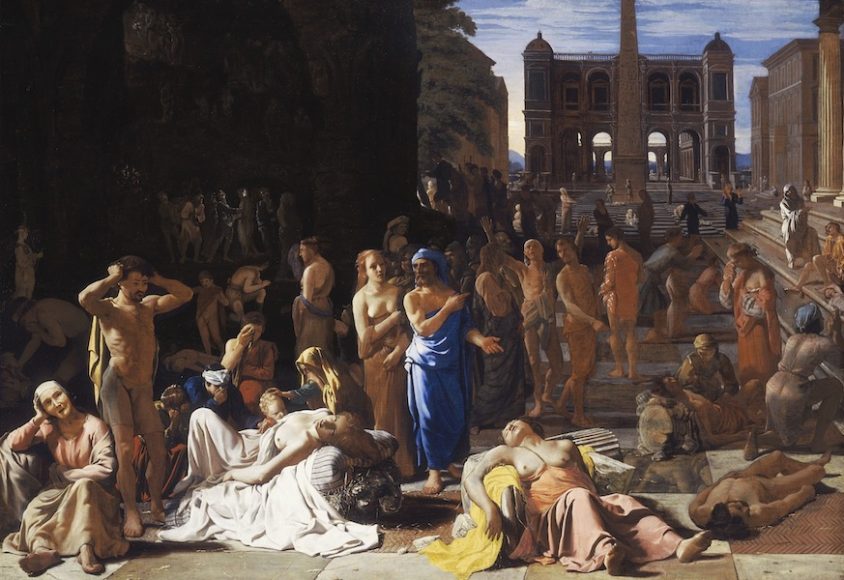What makes a great leader? Studies have identified any number of traits — intelligence, diligence, extraversion, open-mindedness and self-sufficiency — but those could describe a fine middle manager or any successful businessman.
No, a great leader has something extra, something elusive and almost undefinable — almost. He, or increasingly she nowadays, has the ability to create, communicate and implement a shared vision — and, when the going gets tough, to temper tough love with optimism for the future.
The leadership question is perhaps the most important one we can ask right now, as we are in a moment of crisis, not the least of which is a crisis in leadership. The coronavirus — an implacable foe of high contagion and versatility — was always going to be devastating. But it has been greatly exacerbated by the systemic failure of Alexandrian leadership — leadership from the front — a quality that’s been lacking in the bunker mentality of the digital age. (Whatever else you may think of Alexander the Great, the Macedonian conqueror of the Persia Empire who inherited the hegemony of Athens and the other Greek city-states from his father, Philip II, he never asked his army or his people to do anything that he didn’t lead and share in.)
The irony in this is that to lead from the front you must put yourself last. You must be the servant of all, knowing that with great, incorruptible power comes great responsibility. This is a central tenet of the world’s major religions but particularly Christianity. In Matthew 23:11, Jesus, who washed the feet of his disciples at the Last Supper, says: “But he that is greatest among you shall be your servant.”
A great leader, then, leads by example. Does German Chancellor Angela Merkel wear a mask? Run into her at the grocery store and see for yourselves, she offered. Throughout the coronavirus crisis, Merkel, New Zealand Prime Minister Jacinda Ardern and Scottish First Minister Nicola Sturgeon have been able, in Churchillian fashion, to balance the realistic need for communal sacrifice in the face of grave challenge with the hope that the challenge will be met.
It’s telling that these countries are led by humble but confident, pragmatic, quietly efficient women. Meanwhile, many of the countries that haven’t fared well or as well have been led by blustering “strongmen” — tough guys who are not actually strong and dwell in denial — delaying vital supplies, testing and contact tracing; refusing to wear masks and social distance; and putting profits before people in reopening too quickly. This phenomenon, which suggests the need for a new model of leadership that values “feminine” qualities, in the Jungian sense of the word, is not lost on others. In May, Helen Lewis, writing in The Atlantic, identified a pattern: Countries led by women did better in the time of the coronavirus than those led by the strongmen, giving lie to the idea that women lack leadership qualities. (In the past they just lacked opportunities, although that didn’t stop England’s Elizabeth I and Russia’s Catherine the Great, two of histories shrewdest, most sophisticated rulers.)
In truth, there have been instances of fine leadership from America’s governors and mayors — male and female, white and black, Republican and Democratic. And yet that may not be enough. Cases of the virus haven risen in California, where Gov. Gavin Newsome was proactive early on, just as they are in Texas and Florida, where Govs. Greg Abbott and Ron DeSantis respectively were not.
The complex relationship of leadership to society is one we have seen time and again. In 430 B.C., amid its Peloponnesian War with archrival Sparta, Athens was struck by a pandemic from Ethiopia that came through the eastern Mediterranean and entered the port of Piraeus. (Historians are unsure of its exact nature. It could’ve been anything from Ebola to smallpox to typhus.) What is clear is that it devastated the city at a moment when its longtime leader, Pericles — the man synonymous with the golden age in Greece — had brought people in from the countryside for safety, thereby swelling the population, straining the food supply and putting the entire city at increased risk of infection.
The people rebelled, but Pericles — who had terrific communication skills, a must for a true leader — was able to assuage and rally them. When his two legitimate sons died, however, something of the light went out in him. Pericles himself succumbed to the plague in 429 B.C. at age 66. The disease returned to Athens from 427 to 425 B.C. but the city’s subsequent leaders were no Pericles. Though Athens would recover sufficiently to mount a military campaign, the losing Sicilian Expedition, in 415 B.C., its star had dimmed. It would never be the same.
Nor would the Maya. Across the Atlantic some 1,200 years after Pericles, they abandoned the stunning stone civilization they had created throughout what is now Mexico and Central America. Whether because of war, drought or overpopulation, they lost faith in their kings. One moment they were living in magnificent cities that displayed their intricate knowledge of everything from the arts to astronomy. The next they disappeared back into their lush forests.
Great civilizations rest on the shoulders of great leaders, but in the end, that leadership may not stem the tide of history. And yet without real leadership, nations have little chance to survive — and thrive.





